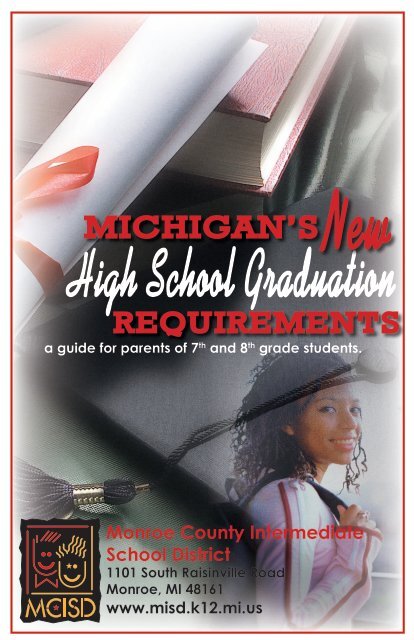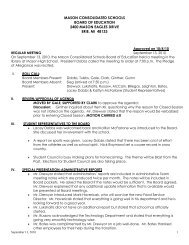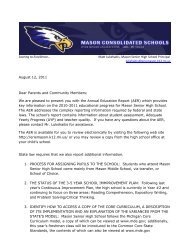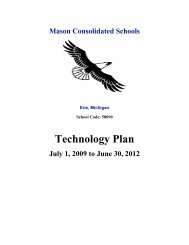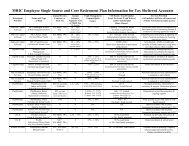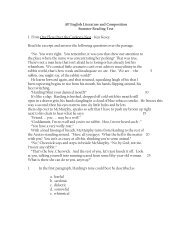High School Graduation Guidelines - Mason Consolidated Schools
High School Graduation Guidelines - Mason Consolidated Schools
High School Graduation Guidelines - Mason Consolidated Schools
Create successful ePaper yourself
Turn your PDF publications into a flip-book with our unique Google optimized e-Paper software.
Michigan’s New<br />
<strong>High</strong> <strong>School</strong> <strong>Graduation</strong><br />
Requirements<br />
a guide for parents of 7 th and 8 th grade students.<br />
Monroe County Intermediate<br />
<strong>School</strong> District<br />
1101 South Raisinville Road<br />
Monroe, MI 48161<br />
www.misd.k12.mi.us
Monroe County Intermediate <strong>School</strong> District<br />
1101 South Raisinville Road•Monroe, Michigan 48161<br />
734.242.5799<br />
www.misd.k12.mi.us<br />
Administration<br />
Donald A. Spencer<br />
Superintendent<br />
Joseph Kukulski<br />
Assistant Superintendent<br />
for Special Education<br />
Elizabeth J. Taylor<br />
Assistant Superintendent<br />
for Human Resources<br />
and Legal Counsel<br />
Stephen J. McNew<br />
Assistant Superintendent<br />
for Curriculum & Instruction<br />
Nancy Swanson<br />
Assistant Superintendent<br />
for Business and<br />
Administrative Services<br />
Charlene Jenkins<br />
President<br />
Board of Education<br />
Jerry Schuon<br />
Treasurer<br />
Earl Cousino<br />
Vice-President<br />
Dale DeSloover<br />
Trustee<br />
Larry Hammons<br />
Secretary<br />
Mission<br />
The Monroe County Intermediate <strong>School</strong> District promotes educational<br />
excellence by serving in a visionary leadership role to collaborate and<br />
facilitate improvements of school programs and services. These efforts<br />
will be driven by pertinent research, continual assessment of needs, and<br />
coordination of community resources. As a result, county students will be<br />
prepared to live, learn, and work in an ever-changing world.
What you need to know about Michigan’s New<br />
<strong>High</strong> <strong>School</strong><br />
<strong>Graduation</strong> Requirements<br />
Introduction<br />
Holding students to consistent, high standards that will prepare<br />
them for the life and global economy they will face is the<br />
focus behind Michigan’s new high school graduation requirements.<br />
Successfully completing these requirements will give your high school<br />
graduate a strong foundation in preparation for higher education<br />
and to be competitive in securing the jobs of the 21 st Century. In the<br />
short-term, the requirements will prepare your student to pass the<br />
Michigan Merit Exam and assist in college admission.<br />
The State Board of Education introduced the new requirements,<br />
called the Michigan Merit Curriculum, in December 2005. When<br />
the state legislature enacted the requirements as law in March<br />
2006, they became the driving force behind high school reform in<br />
Michigan and are among the most rigorous in the nation. In satisfying<br />
these requirements, graduates will meet and often surpass the most<br />
stringent entry requirements for all colleges and universities in the<br />
state, and will provide the academic and applied learning skills<br />
business and industry leaders say they need in their work force.<br />
While the new requirements dramatically change the face of<br />
education in Michigan, parent involvement remains critical to a<br />
student’s success. The failure of even one semester of a required<br />
course could result in your son or daughter being in danger of not<br />
graduating with his/her class. While local districts will continue to<br />
determine the total number of credits needed to graduate, the state<br />
has now set the number of credits in each subject area and, in many<br />
cases, specified the specific courses that must be taken in English,<br />
mathematics, science, social studies, health/physical education,<br />
the arts (visual, performing or applied), and world languages. An<br />
online learning experience is also required.<br />
2006-2007 Michigan Merit Curriculum<br />
i
With the exception of world languages, these requirements, are<br />
effective with the Class of 2011—8th graders in 2006–2007. If you<br />
have children who will graduate in 2011 or later, it is essential that<br />
you fully understand the requirements so you can guide your child<br />
in making sound academic decisions as s/he moves toward high<br />
school graduation.<br />
This document is being provided to all parents of students in grades<br />
seven and eight in Monroe County because of your important role.<br />
This parent guide outlines the new requirements and provides basic<br />
information. However, questions dealing with various complex<br />
issues still remain and are not addressed in this document. As these<br />
mandated requirements are still new, the Michigan Department<br />
of Education is continuing to examine and respond to the many<br />
implications of this legislation.<br />
As general information becomes available, you will be able to find<br />
it on the MCISD’s website: Go to www.misd.k12.mi.us. For questions<br />
specific to your child, contact your school district curriculum<br />
administrator or assistant superintendent of instruction, your building<br />
principal, or call 734.242.5799, ext. 1300.<br />
Important Information...<br />
Implementation guidelines are pending. Information<br />
is subject to change as guidelines become available.<br />
For most current information go to:<br />
www.misd.k12.mi.us<br />
Monroe County Intermediate <strong>School</strong> District<br />
ii
Key concepts<br />
to help you understand the new high school<br />
<strong>Graduation</strong> Requirements<br />
Listed below are ten key concepts to help you understand the new<br />
high school graduation requirements. This is the lens through which<br />
to focus on the new requirements and understand how to help all<br />
children succeed in school.<br />
Terms that are in bold type throughout this booklet can be found in<br />
a glossary at the back of this guide.<br />
1. These requirements apply to ALL students in public schools.<br />
Special education students must satisfy the same standards to<br />
receive a high school diploma with the Individual Education Plan<br />
(IEP) determining the appropriate courses or course of study.<br />
2. Local boards of education may add to the requirements,<br />
but cannot reduce them. Local boards determine the total<br />
number of requirements.<br />
3. While in very limited cases modifications can be made to<br />
some class selections, there is no “opt out” provision.<br />
4. Students can meet the requirements in any type of school<br />
day schedule set by the district (i.e., six-period day, seven-period<br />
day, block schedule, trimesters).<br />
5. There is room left in your child’s high school schedule for<br />
electives.<br />
6. Accelerated, honors, and advanced placement classes will<br />
count toward meeting the graduation requirements if the content<br />
matches the Michigan Merit Curriculum course expectations.<br />
2006-2007 Michigan Merit Curriculum<br />
iii
Key concepts<br />
Continued<br />
7. Districts will continue to offer Career and Technical Education<br />
(CTE) courses. However, some courses may be taught in a manner<br />
that will allow credit to be granted for both CTE and the specified<br />
content area.<br />
8. After all other options have been earnestly attempted, parents<br />
may request a Personal Curriculum that modifies certain of the<br />
standard requirements. However, Personal Curriculums have very<br />
strict guidelines and all other options must be exhausted before a<br />
Personal Curriculum will be considered for a student. It is expected<br />
that Personal Curriculums will be very rare.<br />
9. As of June 2006, all public school teachers in the designated<br />
content areas are required to meet the No Child Left Behind<br />
federal certification and degree standards for highly qualified<br />
teachers.<br />
10. Your child should be prepared to take the classes for<br />
these new requirements. All Monroe County districts have a<br />
comprehensive plan for K–12 curriculum that is based on grade<br />
level content expectations (K–8) and subject area content<br />
expectations (9–12).<br />
Monroe County Intermediate <strong>School</strong> District<br />
iv
Table of Contents<br />
Michigan Merit Curriculum<br />
<strong>High</strong> <strong>School</strong> <strong>Graduation</strong> Requirements chart.............. 2-3<br />
Requirements<br />
Mathematics....................................................................... 4<br />
English Language Arts (ELA).............................................. 5<br />
Science................................................................................ 6<br />
Social Studies....................................................................... 7<br />
Health and Physical Education......................................... 8<br />
Visual, Performing, or Applied Arts................................... 9<br />
World Languages............................................................... 10<br />
Online Experience.............................................................. 11<br />
Career and Technical Education (CTE)............ 12<br />
Educational Development Plans............................ 13<br />
How credit is granted................................................. 13<br />
Key terms......................................................................... 14-16<br />
2006-2007 Michigan Merit Curriculum<br />
1
Michigan Merit Curriculum<br />
<strong>High</strong> <strong>School</strong> <strong>Graduation</strong> Requirements<br />
PA 123 and PA 124<br />
Subject Area Description Personal Curriculum<br />
(Modifications)<br />
English<br />
Language Arts<br />
• Aligned with subject area content<br />
expectations developed by the Department<br />
and approved by the State Board of Education<br />
No modification<br />
4 credits<br />
Mathematics<br />
4 credits<br />
Science<br />
3 credits<br />
Social<br />
Studies<br />
3 credits<br />
• Algebra 1<br />
• Geometry<br />
• Algebra 2<br />
• 1 additional math or math-related credit<br />
• Math or math-related credit in the final year<br />
• Biology<br />
• Chemistry or Physics<br />
• 1 additional Science credit<br />
• .5 Civics<br />
• .5 Economics<br />
• U.S. History and Geography<br />
• World History and Geography<br />
All Students:<br />
Complete at least 3.5 math or math-related credits<br />
Complete a math or math-related credit in final year<br />
Algebra 2 modification options:<br />
Complete 2.5 credits including .5 credit of Algebra 2<br />
OR<br />
Complete a two year Career and Technical education curriculum<br />
which includes .4 credit of Algebra 2 content<br />
OR<br />
Complete Algebra 2 over 2 years with credit given for each year<br />
No modification<br />
No modification<br />
2 credits must be earned<br />
Modified only if student takes additional credit(s) beyond<br />
the required credits in English Language Arts, Math, Science,<br />
or World Languages<br />
Monroe County Intermediate <strong>School</strong> District<br />
2
Health and<br />
Physical<br />
Education<br />
1 credit<br />
Visual,<br />
Performing,<br />
Applied Arts<br />
1 credit<br />
World<br />
Languages<br />
2 credits<br />
Online<br />
Learning<br />
Experience<br />
• Credit guidelines developed by the Michigan<br />
Department of Education<br />
• Credit guidelines developed by the Michigan<br />
Department of Education<br />
Begins with the class of 2016<br />
• Credits earned in Grades 9-12<br />
OR<br />
• An equivalent learning experience in grades K-12<br />
• Online course or learning experience<br />
OR<br />
• Online experience is incorporated into each of the<br />
required credits<br />
Modification only if student takes additional credit(s) beyond<br />
the required credits in English Language Arts, Math, Science,<br />
or World Languages<br />
Modification only if student takes additional credit(s) beyond<br />
the required credits in English Language Arts, Math, Science,<br />
or World Languages<br />
No modification<br />
No modification<br />
NOTES:<br />
• The Class of 2011 (students who are 8th graders in the 2006–07 school year) will need 16 credits in these areas: mathematics, English language arts,<br />
science, social studies, health/physical education, the arts (visual, performing or applied), and online.<br />
• The Class of 2016 (students who are 3rd graders in the 2006–07 school year) will need 18 credits that include the original 16 required credits plus 2 credits<br />
of world languages.<br />
• Special Education students: The Individualized Education Plan (IEP) shall identify the appropriate course or courses of study and identify the supports,<br />
accommodations, and modifications necessary to allow the pupil to progress in the curricular requirements, or in a Personal Curriculum, and meet the<br />
requirements for a high school diploma.<br />
Source: Michigan Department of Education<br />
2006-2007 Michigan Merit Curriculum<br />
3
What you need to know about<br />
Requirement<br />
4 credits<br />
Specifics<br />
1 credit - Algebra 1<br />
1 credit - Geometry<br />
1 credit - Algebra 2<br />
the new<br />
Mathematics<br />
requirements<br />
OR<br />
Personal Curriculum Modification - if applicable<br />
3 credits -<br />
Integrated Sequence<br />
with same course content<br />
1 additional credit, such as:<br />
Trigonometry, Statistics, Pre-Calculus,<br />
Calculus, Applied Math, Accounting,<br />
Business Math, retake of Algebra 2<br />
1 credit must be in senior year<br />
All pupils must have a minimum of 3.5 credits (including 1 credit in senior year)<br />
After 2.5 credits, a pupil may modify his/her Personal Curriculum IF:<br />
• Successfully completed 1 semester of Algebra 2 OR<br />
• Elect to spread Algebra 2 over 2 years OR<br />
• Successfully completing the same content of 1 semester of Algebra 2<br />
in CTE course as part of a formal CTE program.<br />
• A mathematics course must be taken in the senior year, with<br />
no exceptions. Taking four credits of mathematics prior to<br />
the senior year, including 8th grade, does not satisfy the<br />
requirement of having to take a mathematics class in the<br />
senior year.<br />
• If a student takes a mathematics class through dual enrollment<br />
at a college in the 12th grade, it will satisfy the requirement for<br />
having a mathematics class in the senior year.<br />
mathematics<br />
Monroe County Intermediate <strong>School</strong> District<br />
4
What you need to know about<br />
English the new<br />
Language Arts<br />
requirements<br />
Requirement<br />
4 credits<br />
Specifics<br />
Aligned with subject area content<br />
expectations developed by the Michigan Department<br />
of Education and approved by the State Board of<br />
Education.<br />
Personal Curriculum Modification - if applicable<br />
Substitute with<br />
1 additional credit in ELA, Mathematics, Science, or World Languages<br />
• Students will have room in their schedules to take electives in<br />
the visual, performing, or applied arts.<br />
• The Michigan Department of Education will determine credit<br />
guidelines for courses in the visual, performing and applied<br />
arts.<br />
English<br />
language arts<br />
2006-2007 Michigan Merit Curriculum<br />
5
What you need to know about<br />
Requirement<br />
3 credits<br />
Specifics<br />
Personal Curriculum Modification - if applicable<br />
No modification allowed.<br />
the new<br />
Science<br />
requirements<br />
1 credit – Biology<br />
1 credit – Chemistry or Physics<br />
1 additional credit, such as:<br />
Physics or Chemistry, Forensics, Astronomy,<br />
Earth Science, Geology, Agricultural Science,<br />
Environmental Science, Physiology,<br />
Microbiology<br />
• The required science classes—Biology and Chemistry or<br />
Physics—may be offered by the district in any order and taken<br />
by the student in any sequence.<br />
• The science courses are specified because they are most<br />
often the prerequisite courses for additional study in science,<br />
mathematics, or engineering.<br />
• Colleges strongly encourage 4 credits.<br />
science<br />
Monroe County Intermediate <strong>School</strong> District<br />
6
What you need to know about<br />
Requirement<br />
3 credits<br />
the new<br />
Social Studies<br />
requirements<br />
Specifics<br />
1 credit – U.S. History & Geography<br />
1 credit – World History & Geography<br />
.5 credit – Economics<br />
.5 credit – Civics<br />
Personal Curriculum Modification - if applicable<br />
After 2 credits, including Civics, substitute with<br />
1 additional credit in ELA, Mathematics, Science, or World Languages<br />
• The Civics requirement cannot be modified.<br />
social studies<br />
2006-2007 Michigan Merit Curriculum<br />
7
What you need to know about<br />
Requirement<br />
1 credit<br />
Health & the new<br />
Physical Education<br />
requirements<br />
Specifics<br />
.5 credit – Health<br />
.5 credit – Physical Education<br />
Personal Curriculum Modification - if applicable<br />
Substitute with<br />
1 additional credit in ELA, Mathematics, Science, or World Languages<br />
• The state mandate allows a modification for the Health and<br />
Physical Education requirements. However, local boards of<br />
education may still require students to take additional classes<br />
in Health and Physical Education.<br />
health and<br />
physical education<br />
Monroe County Intermediate <strong>School</strong> District<br />
8
What you need to know about<br />
Visual, the new<br />
Performing or Applied Arts<br />
requirements<br />
Requirement<br />
1 credit<br />
Specifics<br />
1 credit in any one category of arts<br />
Personal Curriculum Modification - if applicable<br />
Substitute with<br />
1 additional credit in ELA, Mathematics, Science, or World Languages<br />
• Students will have room in their schedules to take electives in<br />
the visual, performing, or applied arts.<br />
• The Michigan Department of Education will determine credit<br />
guidelines for courses in the visual, performing and applied<br />
arts.<br />
visual, performing,<br />
or applied arts<br />
2006-2007 Michigan Merit Curriculum<br />
9
What you need to know about<br />
Requirement<br />
2 credits<br />
World<br />
Specifics<br />
Personal Curriculum Modification - if applicable<br />
No modification allowed.<br />
the new<br />
Languages<br />
requirements<br />
Effective 3rd grade 2006 (Class of 2016):<br />
2 credits in grades 9–12 OR<br />
equivalent learning experiences grades K–12<br />
• This requirement does not go into effect until the Class of 2016-<br />
students entering 3rd grade in the 2006–2007 school year.<br />
• American Sign Language will satisfy this requirement.<br />
• The Michigan Department of Education will determine the<br />
amount of language instruction needed for a credit if taken in<br />
grades three through eight.<br />
world languages<br />
Monroe County Intermediate <strong>School</strong> District<br />
10
What you need to know about<br />
Online<br />
the new<br />
Experience<br />
requirements<br />
Requirement<br />
Online<br />
Learning<br />
Experience<br />
Specifics<br />
Credit may be earned in an online course, online<br />
learning experience OR integrated online learning<br />
Personal Curriculum Modification - if applicable<br />
No modification allowed.<br />
• Students must complete a meaningful on-line learning experience<br />
in grades 6-12, with a specific emphasis at the high school<br />
level, allowing students to become familiar with a key means<br />
of increasing their own learning skills and knowledge.<br />
• The on-line learning experience guidelines allow students to<br />
meet the graduation requirement with either an approved notfor-credit<br />
program, or take a for-credit on-line course that can<br />
satisfy other requirements of the Michigan Merit Curriculum.<br />
• As technology quickly advances, there will be expanded<br />
opportunities for districts to meet this online learning requirement.<br />
• The online experience requirement will not go into effect until<br />
the district is able to provide the technology necessary to make<br />
achievement of the requirement possible.<br />
online experience<br />
2006-2007 Michigan Merit Curriculum<br />
11
What you need to know about<br />
Career &<br />
Technical Education<br />
opportunities<br />
• Districts will continue to offer Career and Technical Education (CTE)<br />
courses. However, some courses may be taught in a manner<br />
that will allow credit to be granted for both CTE and the specified<br />
content area.<br />
• Eligible students, as determined by local districts, may be able to<br />
participate in a co-op, internship, or externship experience.<br />
• Certain requirements, such as some mathematics or science<br />
courses, may be satisfied in a CTE environment.<br />
• CTE classes are electives. They are generally taken in a specific<br />
sequence and should be considered early in a student’s educational<br />
career. Since the new graduation requirements leave little room<br />
for electives, careful planning will be necessary to schedule CTE<br />
courses.<br />
• <strong>Graduation</strong> requirements taken in the 8th grade, such as Algebra<br />
1 or Spanish 1 (World Languages), will allow more opportunity for<br />
CTE classes/electives during the high school experience.<br />
career and<br />
technical education<br />
Monroe County Intermediate <strong>School</strong> District<br />
12
What you need to know about<br />
Educational<br />
Development Plans<br />
• Educational Development Plans (EDPs) are now required to be<br />
completed by all students before they enter high school which<br />
would include discussions about Career Pathways.<br />
• It is in the best interest of a student to use an EDP to focus and<br />
plan in order to successfully complete the graduation requirements,<br />
and prepare for the transition to the world of work. Parental<br />
guidance is critical.<br />
What you need to know about<br />
how credit is granted<br />
• A student is considered to have completed a credit if the student<br />
successfully completes the subject area content expectations or<br />
guidelines developed by the Michigan Department of Education.<br />
Credit can be granted in a variety of ways (e.g., end-of-course<br />
exams, dual enrollment, testing out, accelerated, honors and/<br />
or advanced placement (AP) courses, summer school make-up<br />
classes).<br />
• A student will be given graduation credit for a requirement that is<br />
successfully completed prior to high school, as long as it is of the<br />
same level of content and rigor associated with the corresponding<br />
high school required course. Taking qualifying classes before high<br />
school will make room in the student’s schedule to take more<br />
electives.<br />
• If a student fails a required course for graduation, no credit is<br />
granted and the class must be made up. Since there is little room<br />
in a student’s schedule each year for make-up classes, the failed<br />
credit can be recovered in various ways, such as summer school or<br />
online.<br />
2006-2007 Michigan Merit Curriculum<br />
13
Key terms<br />
to help you understand the new high school<br />
<strong>Graduation</strong> Requirements<br />
Advanced Placement (AP) Advanced placement classes are<br />
accelerated classes that, when successfully completed in high<br />
school, help determine placement in college. Although a student<br />
would not get college credit for the class, by passing the class the<br />
student would not have to take that class in college, but could<br />
move ahead to the next required class.<br />
NOTE: Successful completion of certain AP classes counts toward meeting<br />
the high school graduation requirements.<br />
Career Pathways Broad groupings of careers that share similar<br />
characteristics and whose employment requirements call for<br />
many common interests, strengths, and competencies. Students<br />
opting for Career and Technical Education elective courses will<br />
most likely choose courses that fit the career pathway they have<br />
chosen as a general area of interest they wish to pursue.<br />
NOTE: Some of these courses, if taught by a teacher meeting the highly<br />
qualified standards set by the federal No Child Left Behind initiative, can<br />
be applied toward the high school graduation requirements<br />
CTE Career Technical Education<br />
Dual Enrollment When a high school student successfully<br />
completes a course as part of dual enrollment through a college<br />
or university, the student will get credit for that class at either the<br />
high school or higher education level or, in some cases, both.<br />
NOTE: Successful completion of certain dual enrollment classes counts<br />
toward meeting the high school graduation requirements.<br />
Educational Development Plan (EDP) An educational<br />
development plan documents an ongoing process in which a<br />
learner identifies both career goals and a plan of action to achieve<br />
them. EDPs are developed for every student in middle/junior<br />
high school and periodically revised, throughout their secondary<br />
educational experience, to reflect the student’s career interests<br />
and options.<br />
Monroe County Intermediate <strong>School</strong> District<br />
14
Key terms<br />
Continued<br />
ELA Equivalent Learning Experience guidelines will be developed<br />
by the Michigan Department of Education.<br />
Equivalent Learning Experience To be deemed highly<br />
qualified, teachers must have: 1) Bachelor’s degree, 2) Full state<br />
certification or licensure, and 3) Proof that they know each subject<br />
that they teach.<br />
<strong>High</strong>ly Qualified Teacher The official title for the new high school<br />
graduation requirements is the Michigan Merit Curriculum. To get<br />
a high school diploma from a Michigan high school, students<br />
must successfully complete all the elements in the Michigan Merit<br />
Curriculum. The curriculum is shown in full on pages 2–3.<br />
Michigan Merit Curriculum The new Michigan Merit Exam tests<br />
English, mathematics, science, U.S. history, government, world<br />
history, and geography in the 11th grade, including the ACT Test<br />
that is used by colleges for admission purposes. The new required<br />
curriculum is designed so that students will take the appropriate<br />
courses in preparation for this test.<br />
Modification Modifications to a student’s curriculum do not allow<br />
for an “opt out” of any requirement. However, in certain<br />
instances, modifications can be made to adjust the curriculum in<br />
mathematics, social studies, health and physical education, and<br />
visual, performing or applied arts.<br />
NO modifications are allowed in meeting the English, science, or<br />
world languages requirements.<br />
Modification allowances must be made as part of a Personal<br />
Curriculum requested by the parent or guardian.<br />
2006-2007 Michigan Merit Curriculum<br />
15
Key terms<br />
Continued<br />
Personal Curriculum The parent/guardian of a student may<br />
request a personal curriculum for the student that modifies<br />
certain of the Michigan Merit Curriculum standard requirements.<br />
If all of the requirements for a personal curriculum are met, then<br />
the board of a school district may award a high school diploma<br />
to a student who successfully completes his or her personal<br />
curriculum, even if it does not meet the requirements of the<br />
Michigan Merit Curriculum standard.<br />
The personal curriculum will be considered only after all other<br />
options have been attempted, and must meet stringent<br />
requirements for determining educational goals and evaluating<br />
student progress.<br />
Subject Area Content Expectations Content expectations were<br />
developed to provide a description of what students should<br />
know and be able to do by the end of high school for<br />
postsecondary success—college, careers, and community.<br />
The expectations provide a foundation for curriculum and<br />
assessment development that represents rigorous and relevant<br />
learning for all high school students.<br />
Testing Out <strong>High</strong> school students may “test out” or be given<br />
credit for a high school course that they are not enrolled in by<br />
exhibiting a certain level of mastery in the course. The student<br />
must receive a grade of not less than a C+ on a final exam,<br />
or other means of basic assessment, in order to receive credit.<br />
Testing out guidelines to meet the new graduation requirements<br />
will be developed by the Michigan Department of Education.<br />
World Languages Any language other then English, including<br />
American Sign Language.<br />
Monroe County Intermediate <strong>School</strong> District<br />
16
Helpful Links<br />
• Michigan Merit Exam<br />
www.michigan.gov/mme<br />
• <strong>High</strong> <strong>School</strong> Reform<br />
& <strong>Graduation</strong> Requirements<br />
www.michigan.gov/highschool<br />
• Michigan eMerit Award<br />
www.michigan.gov/merit<br />
•<br />
Thank you to Macomb Intermediate <strong>School</strong><br />
District for providing the necessary materials for<br />
developing the Monroe County <strong>High</strong> <strong>School</strong><br />
<strong>Graduation</strong> Requirement Guide.
Airport Community <strong>School</strong>s<br />
Bedford Public <strong>School</strong>s<br />
Dundee Community <strong>School</strong>s<br />
Ida Public <strong>School</strong>s<br />
Jefferson <strong>School</strong>s<br />
<strong>Mason</strong> <strong>Consolidated</strong> <strong>School</strong>s<br />
Monroe Public <strong>School</strong>s<br />
Summerfield <strong>School</strong>s<br />
Whiteford Agricultural <strong>School</strong>s<br />
Monroe County Intermediate <strong>School</strong> District<br />
1101 South Raisinville Road<br />
Monroe, MI 48161<br />
www.misd.k12.mi.us<br />
The Monroe County Intermediate <strong>School</strong> District does not discriminate on the basis of religion, race, color, national origin, sex, disability, age, height, weight,<br />
marital status or familial status in its programs, activities or in employment The following person has been designated to handle inquiries regarding the nondiscrimination<br />
policies: Elizabeth J. Taylor, Assistant Superintendent for Human Resources and Legal Counsel, 1101 South Raisinville Road, Monroe, MI<br />
48161, 734.242.5799, ext. 1200. For further information on notice of non-discrimination, see list of OCR enforcement offices for the address and phone number of<br />
the office that serves your area or call 1.800.421.3481.


